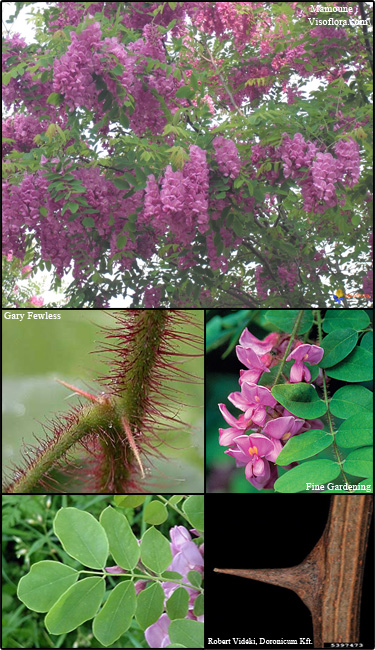Bristly locust (Robinia hispida)
 Common Names: Rose acacia, mossy locust
Common Names: Rose acacia, mossy locustDescription: Introduced to North America as an ornamental tree and to prevent soil erosion. This species is considered invasive in the state of Michigan, New Jersey, Ohio, Pennsylvania and Washington. All parts of this plant are mildly poisonous.
Habit: Deciduous tree or small suckering shrub, growing from 2-10 ft tall, new shoots are glandular-bristly. Often found in thickets since it spreads rapidly from root suckers.
Leaves: Alternate, pinnately compound; 9-13 entire, elliptical leaflets; 7-9 in long, green in color above and paler below.
Stems: Slender, zigzag and covered in bristly red hairs, later turning a gray-brown in color. buds sunken, no spines.
Flowers: Perfect, attractive, rose colored pea-like in hanging clusters, yellow spot in the center, appearing in late spring.
Fruit and seeds: Flat pod, 2-2.5 in long and very bristly.
Habitat: Native to the southern United States. Grows well on dry, well-drained, moist, sunny or shaded areas.
Reproduction: Vegetatively by root suckers.
Similar species: New Mexican locust (Robinia neomexicana) and Black locust (Robinia pseudoacacia).
Monitoring and rapid response: Cutting is not recommended. Can be controlled with foliar spray FS-1 Glyphosate 3.75%, Triclopyr Amine 2.50% or with Basal Bark BB-1 Triclopyr Ester 25% Credits: The information provided in this factsheet was gathered from the Virginia Tech Department of Forest Resources and Environmental Conservation VTree.
Individual species images that appear with a number in a black box are courtesy of the Bugwood.org network (http://www.invasive.org).Individual photo author credits may not be included due to the small display size of the images and subsequent difficulty of reading the provided text. All other images appear courtesy of Google (http://images.google.com).
